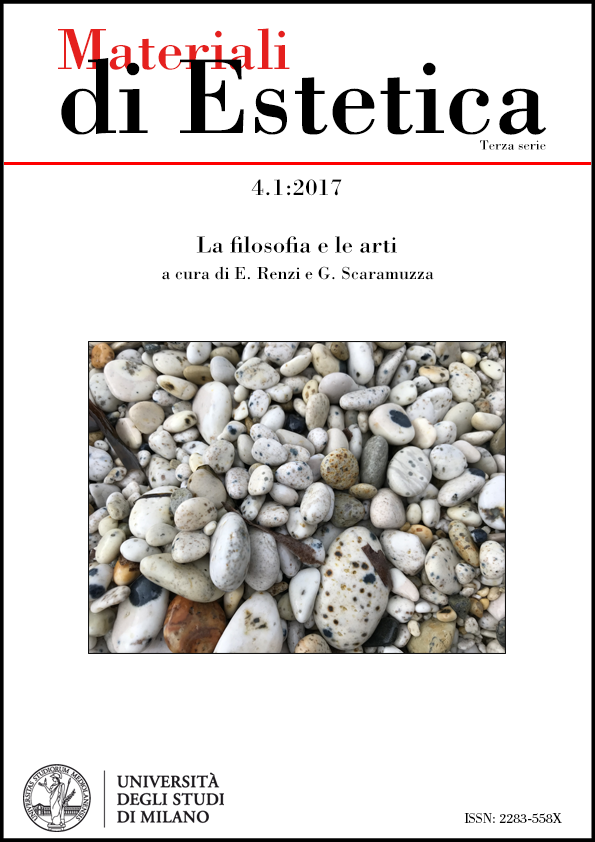Il dominio della forma. Alcune osservazioni sopra Rimi di Gabriele Frasca
DOI:
https://doi.org/10.13130/mde.v%25vi%25i.9563Abstract
The power of form over matter and the impotence of freedom of expression against ideology are the two milestones that Gabriele Frasca’s text seeks to mark. A critique of today’s literary production can not avoid reckoning with the great sale of emotions on the one hand and the small sale of technique on the other; when no canon is accepted and the courses of creative writing and writers are multiplied, choosing to submit to the discipline of the hendecasyllable, as Gabriele Frasca does in his "Rimi", is a political rather than an aesthetic choice. The tripartition of the text can be read as a path: the elaborations from De Quevedo present the material, the tradition to which Frasca draws and the limit beyond which language can not be pushed. The baroque use of citations, not always explicit, in the initial sonnets is a sort of presentation or preface, a list of dramatis personae that will have to enter the scene when the show begins. The central prose of "Rimi", also in hendecasyllables, put on stage, so to speak, what the remakes by Quevedo had presented: metric and rhythm, limits and possibilities of language clash with experience, where the result forms, in a quite paradoxical way, a dialectic between concept and experience much more effective than simple free expression; as if the formal constriction of the meter would amplify the poetic function of the "form" rather than rigidify it in dead forms. Beckett, of whom Frasca is an extraordinary translator, and the implicit dialogues of the last Kafka - "The Burrow", "Reflections of a dog" and "Josephine the singer" - are possible references for interpreting the monologues of the central prose of the volume, with reflections on the impotence and extreme attempt to save not only poetry in verse but literature in general. The reading of the prose of "Rimi" is a sort of experience, or rather: a simulation of experience that is just what the "old words" can still do. The last section of the book, consisting in translations from the welsh Dylan Thomas, is a service and an opening. The discipline of the translator - who does not have to write but transpose - meets with the intention to continue, with the conviction, only at first sight rational, according to which shaping the existing is a way, perhaps unique, to redeem what is went wrong and should not have. So that, in the end, the place where the "old words" led us is not only a setback, the end of the "dream of a thing", but also a victory, or at least a weapon against real life’s offenses.
Downloads
Riferimenti bibliografici
AA. VV., “Nuovi Argomenti”, settembre 2015.
ADORNO, Theodor Wiesengrund, HORKHEIMER, Max, Dialettica dell'Illuminismo, Einaudi, Torino 1980.
ALIGHIERI, Dante, La divina commedia, Einaudi, Torino 1975.
BECKETT, Samuel, Ends and Odds, Avalon Travel Publishing, Berkeley 1994.
– , Nohow On, Grove Press, New York 1996.
CHOMSKY, Noam, La grammatica generativa trasformazionale, Boringhieri, Torino 1969.
DE QUEVEDO, Francisco, Sonetti amorosi e morali, Passigli, Firenze 2011.
DISEGNI, Dario (a cura di), Bibbia ebraica, Profeti posteriori, Giuntina, Firenze 2011.
FRASCA, Gabriele, Rimi, Einaudi, Torino 2013.
FREUD, Sigmund, Introduzione alla Psicoanalisi, Boringhieri, Torino 1983.
GOLDONI, Carlo, Il servitore di due padroni, Einaudi, Torino 1963.
HEGEL, Georg Wilhelm Friedrich, Phänomenologie des Geistes, Felix Meiner Verlag, Hamburg 1988.
KAFKA, Franz, “La tana” in Id., Racconti, Mondadori, Milano 1978.
LEOPARDI, Giacomo, I canti, Einaudi, Torino 1962.
PETRARCA, Francesco, Canzoniere, Einaudi, Torino 1964.
RILKE, Rainer Maria, Elegie Duinesi, Einaudi, Torino 1978.
YEATS, William Butler, The Poems. The collected Works of W. B. Yeats, Palgrave MacMillan, London 1991.






